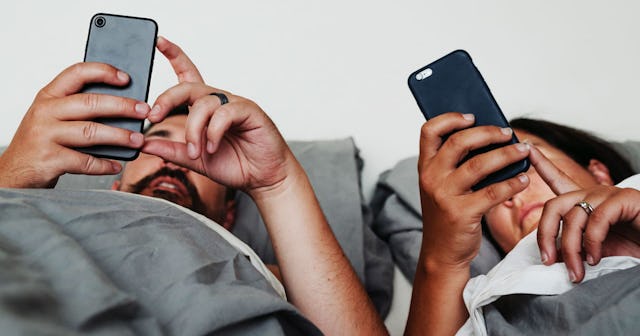Is Your Smartphone Destroying Your Relationship? Here's How To Tell If It's A Problem

Smartphones are everywhere. Roughly 85 percent of Americans own one of these devices. But we all know that these phones — these bastions of information and connection — can be addictive.
And it’s no wonder. As an article from the Addiction Center explains, “according to former Google design ethicist Tristan Harris, features like ‘pull to refresh’ were inspired by slot machines and other casino games. Designers and engineers meticulously develop every aspect of the device to create fanatical users.”
Of course, this information is not surprising; most mediums are designed to keep users engaged. However, cell phone addiction, or “phubbing,” is impacting many friendships and relationships, long before the pandemic had many of us reaching for our phones as a way of outside connection. A 2015 survey conducted by Baylor University’s Hankamer School of Business found that 46 percent of respondents had been phubbed by their partner, and 23 percent said this behavior created conflict in their relationships.
“Cell phones ruin relationships because [while] their usage might connect us to the virtual world and people far away… [they] can distract us from the ones near us and deprive us of the important things,” an article on Marriage.com explains.
But what are the signs of phone addiction? How do you know if your usage is really a problem? According to PsychGuides, exhibiting four or more of the following signs may suggest you are addicted to your phone:
- having and/or experiencing a desire or need to use your cell phone
- persistent failed attempts to put your phone down
- experiencing a preoccupation with your smartphone
- using your cell phone as an escape, particularly from unwanted feelings like anxiety or depression
- losing time
- having put a relationship or job at risk due to excessive cell phone use
- withdrawal, from others and yourself — i.e., neglecting things and hobbies which once brought you joy
In other words, FOMO is real and can become a problem.
Make no mistake: Cell phones can be beneficial. They help you access information, quickly and with the push of a button, an entertain you. And yet these “perks” mean nothing if they are pulling you away from the present.
The good news is you can do something about it. Apps like BreakFree and Menthal will help you monitor the time you’ve spent on your phone. Practicing mindfulness can be beneficial, as the discipline is designed to keep you present.
But like other addictions, the first step to recovery is acceptance. So if you or your partner are worried — if your relationship has taken a hit — take notice. And remember: while technology is great, real life is often even better.
This article was originally published on